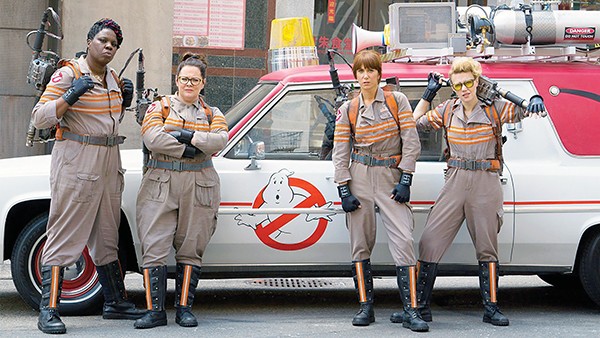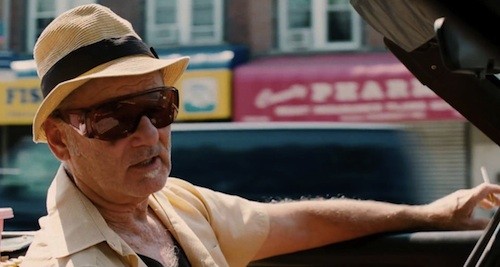Why remake Ghostbusters?
A perfect movie is a rare beast. To make every shot work, every actor deliver, to land every script beat requires skill, vision, and luck. The 1984 Ghostbusters originated in the fevered brain of Dan Aykroyd while he was in the middle of one of comedy’s greatest hot streaks. The OG SNL star conceived of three movies to feature him and his best friend, John Belushi: The Blues Brothers, Ghostbusters, and Spies Like Us. Just as the unlikely success of The Blues Brothers gave the pair the run of Hollywood, Belushi OD’d. Aykroyd and Caddyshack director Harold Ramis retooled Ghostbusters‘ insane first draft, which featured psychedelic scenes of astrally projecting Ghostbusters fighting hordes of interdimensional spectres, as a more grounded ensemble movie set in New York City.
In 1984, all the pieces fell together for producer/director Ivan Reitman to make the quintessential action comedy. Aykroyd and Ramis created a pair of indelible geek icons in the schlubby Ray Stantz and the Spock-like Egon Spengler. Sigourney Weaver did duel duty as symphony musician Dana Barrett and gatekeeper spirit Zuul, playing off of Rick Moranis as a geeky accountant possessed by the Keymaster Vinz Clortho. The role of Winston Zeddmore was originally offered to Eddie Murphy, but when he turned it down in favor of Beverly Hills Cop, Ernie Hudson stepped into the thankless role of audience surrogate. Looking back on Ghostbusters from the perspective of 2016, it’s clear that Bill Murray is the key to the picture’s success. His Lothario con man turned paranormal investigator Peter Venkman is a perfectly pitched performance worthy of Chaplin, Keaton, or Cleese.
Remaking Ghostbusters seemed a fool’s errand. Reitman captured lightning in a bottle, an artifact of a certain moment when all the players were at the top of their game, by mixing ’80s horror beats with Second City gonzo yucks. Even the core creative team couldn’t reproduce the magic. Remember Ghostbusters II? Of course not. You might as well try to remake Casablanca.
This was the task set before director Paul Feig. In a move that upset a vocal hoard of internet man-babies, the creator of Freaks and Geeks upped the already impossible difficulty level by gender-swapping the characters. Well, I’m here to tell you that the Men’s Rights movement picked the wrong hill to die on.

Leslie Jones, Melissa McCarthy, Kristen Wiig, and Kate McKinnon don the proton packs in Paul Feig’s remake of Ghostbusters.
Feig surmised that the secret of Ghostbusters was in the chemistry, and the director of Bridesmaids knows funny women. The team of Kristen Wiig, Melissa McCarthy, Kate McKinnon, and Leslie Jones is even more finely balanced than Murray, Aykroyd, Ramis, and Hudson. Wiig’s Erin Gilbert, a former paranormal investigator trying to get tenure as a physics professor at straight-laced Columbia University, can’t touch the crystalline genius of Murray, but she’s a good fit for this version. McCarthy hones her wild talent with discipline and precision, turning in the best performance of her career as Abby, the Ray Stantz analog. Feig and Parks and Recreation writer Katie Dippold’s script gives Jones’ character, Patty, a New York transit employee who gets sucked into the Ghostbusters’ world, more to do than Hudson, and the film is all the better for it. The most perverse casting choice is Chris Hemsworth in a hybrid of Sigourney Weaver and Annie Potts’ cynical receptionist; Thor rises to the occasion by whipping out previously unseen comedy chops. But it’s McKinnon who slyly steals the show. McKinnon reworks Ramis with a brash physicality. Geeks are cool now, but McKinnon, who takes her look from the animated version of Egon, avoids the autistic minstrel show approach epitomized by The Big Bang Theory and wrings more depth out of renegade techie Holtzmann than the script provides.
As long as Feig and Dippold follow Aykroyd and Ramis’ beats, the movie hums along, but when they attempt to graft on a parody of The Avengers climax in place of the intimate confrontation with Gozer the Destructor, the film spins out of control. Still, speaking as an old school Ghostbusters fan, this remake is better than it has any right to be. In 1984, Ghostbusters was a standout in a quality field that included Indiana Jones and the Temple of Doom, Purple Rain, and fellow action comedy classics Gremlins and Romancing the Stone. 2016’s Ghostbusters comes as a sip of water in a historic drought. Feig has pulled off the impossible by successfully reworking an unlikely masterpiece, and everyone involved deserves major kudos.
But seriously, let’s not try to remake Casablanca, OK?

